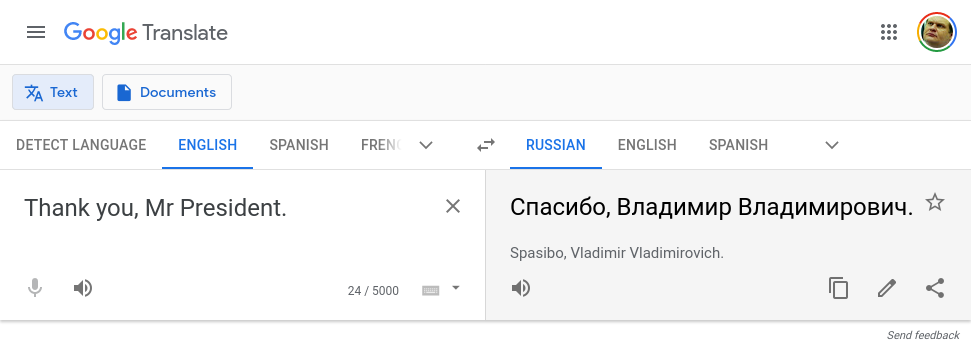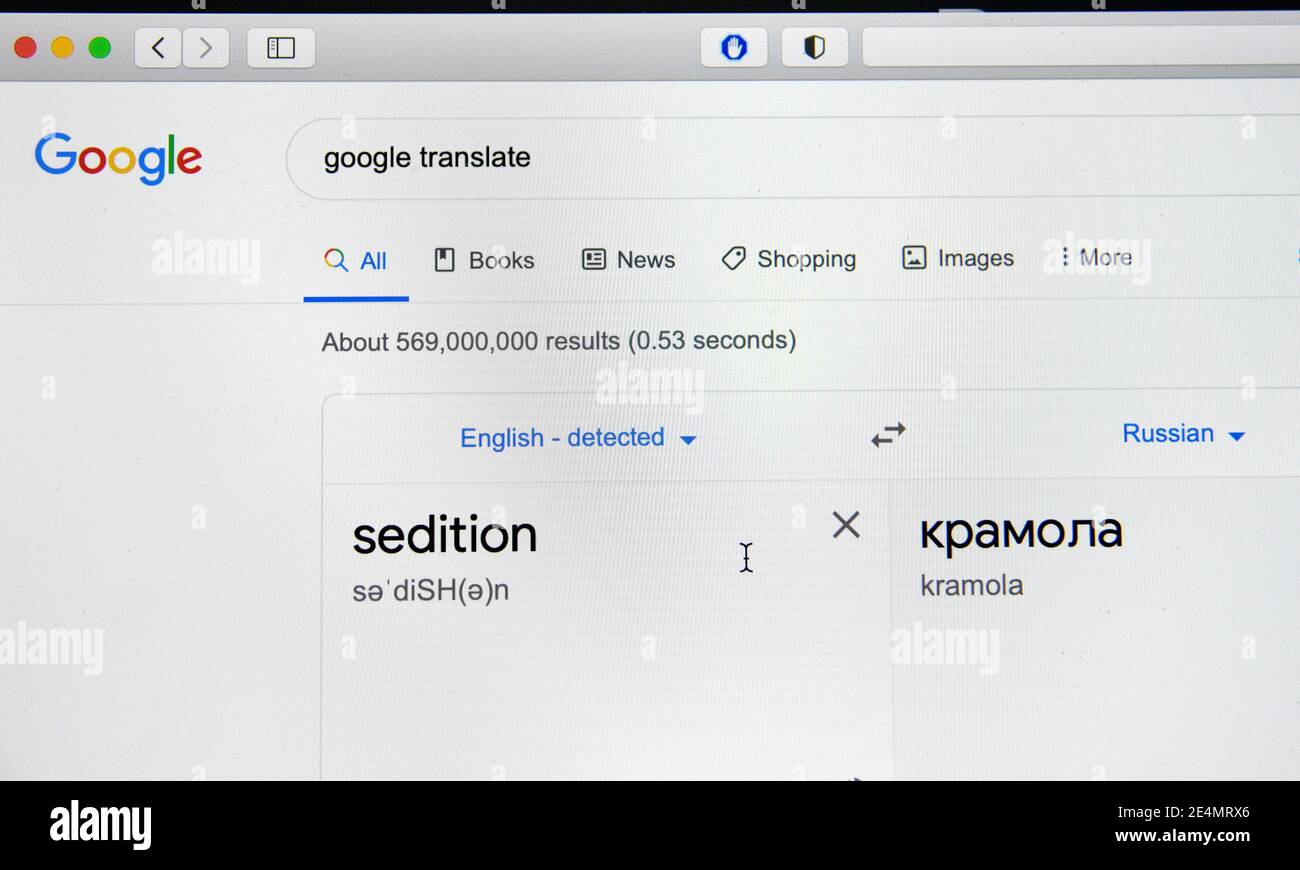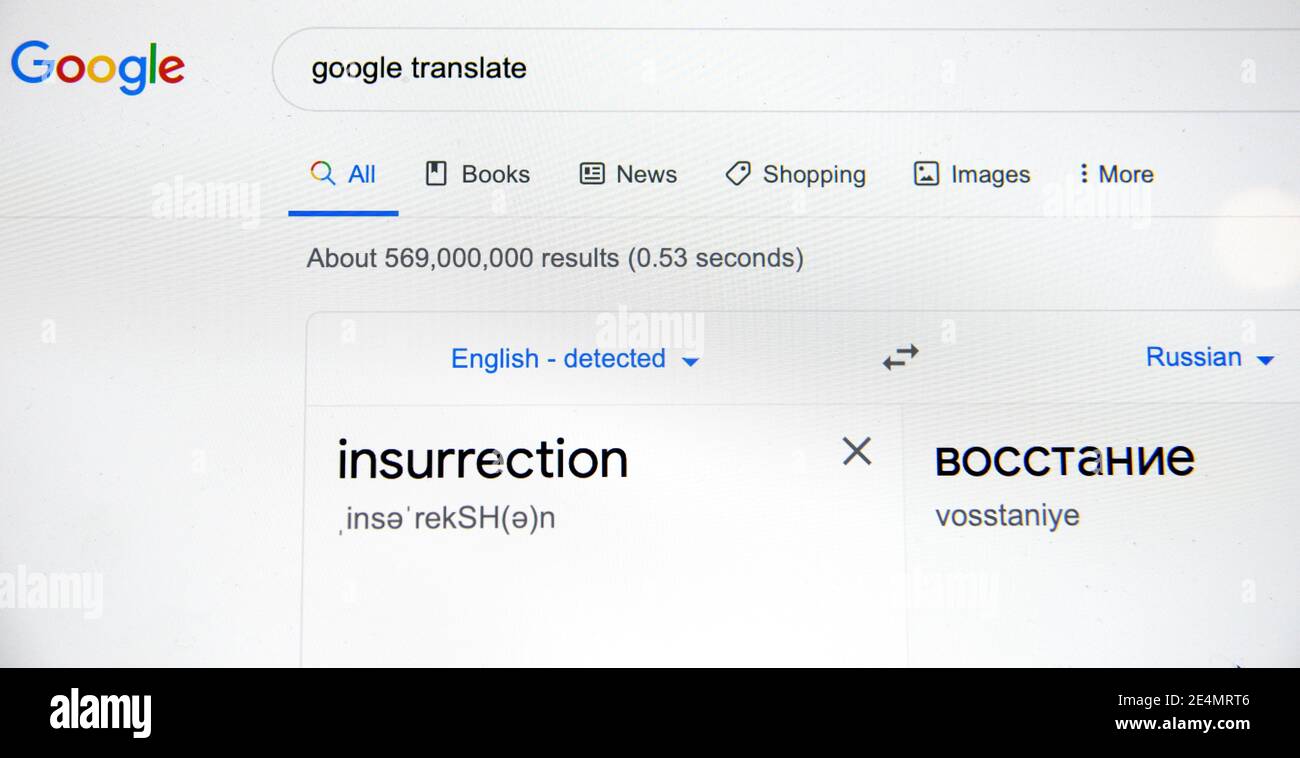Topic can google translate russian to english: Discover how Google Translate bridges communication gaps, enabling seamless Russian to English translations and fostering global connections.
Table of Content
- Can Google translate Russian to English accurately?
- Overview of Google Translate\"s Capabilities for Russian to English Translation
- How to Use Google Translate for Russian to English Translation
- Accuracy and Limitations of Google Translate for Russian to English
- Features of Google Translate for Enhancing Russian to English Translation Quality
- Comparison with Other Translation Tools for Russian to English
- Common Use Cases for Russian to English Translation on Google Translate
- YOUTUBE: Google Translate: I speak Russian
- User Reviews and Feedback on Russian to English Translations
- Tips for Getting the Best Results with Google Translate from Russian to English
Can Google translate Russian to English accurately?
Yes, Google Translate can accurately translate Russian to English. Here are the steps to use Google Translate for translating Russian to English:
- Open the Google Translate website or app.
- Select \"Russian\" as the source language.
- Select \"English\" as the target language.
- Enter the Russian text you want to translate.
- Press the \"Translate\" button or hit enter.
- The translated text will be displayed in English.
Google Translate is generally a reliable tool for translating between different languages, including Russian and English. However, it\'s important to note that machine translation may not always capture the full nuance and context of the original text, especially for complex or specialized content. It is always a good idea to review and verify the translation for accuracy, particularly for important or sensitive documents.

READ MORE:
Overview of Google Translate\"s Capabilities for Russian to English Translation
Google Translate is a powerful tool that offers instant Russian to English translations, making it easier for users to understand and communicate across languages. With its advanced technology, Google Translate supports various formats including text, speech, and document translations, ensuring users can easily translate websites, messages, and documents from Russian to English and vice versa.
- Text Translation: Type or paste text in Russian to get its English translation instantly.
- Speech Translation: Speak in Russian and receive a spoken translation in English, facilitating real-time conversation.
- Document Translation: Upload documents in Russian and receive their translations in English, preserving the original layout.
- Website Translation: Translate entire web pages from Russian to English with a single click, making information more accessible.
Google Translate utilizes machine learning technology to continuously improve its accuracy and fluency, providing users with translations that are not only immediate but also increasingly precise over time. This tool is invaluable for travelers, students, professionals, and anyone looking to break language barriers between Russian and English.

How to Use Google Translate for Russian to English Translation
Using Google Translate for Russian to English translation is straightforward and user-friendly. Follow these simple steps to start translating immediately:
- Open Google Translate: Visit the Google Translate website or open the app on your mobile device.
- Select Languages: Choose Russian as the source language and English as the target language.
- Input Text: Type, paste the Russian text, or use the keyboard icon to enter text manually.
- Use Voice Translation: Click on the microphone icon to speak in Russian and receive instant voice translation in English.
- Translate Documents: Upload Russian documents by clicking on the \"Documents\" button to translate them into English.
- Translate Websites: Enter a website URL in the text box and select \"Translate\" to view the website in English.
- Use Conversation Mode: For real-time spoken conversation translation, use the conversation mode available in the mobile app.
- Download Translations: Save your translations for offline access, especially useful while traveling.
Google Translate\"s intuitive interface and versatile features make it an indispensable tool for translating between Russian and English, whether for personal use, education, or professional purposes.
Accuracy and Limitations of Google Translate for Russian to English
Google Translate\"s effectiveness in converting Russian to English has improved significantly over the years, thanks to advances in machine learning and artificial intelligence. However, users should be aware of its accuracy and limitations:
- General Accuracy: For basic phrases and sentences, Google Translate provides highly accurate translations from Russian to English, making it useful for everyday communication and understanding.
- Complex Texts: Accuracy decreases with complex sentences, idiomatic expressions, and specialized terminology. Contextual nuances may be lost or incorrectly interpreted.
- Grammar and Syntax: While Google Translate has improved in handling grammar and syntax, errors may still occur, especially with complex grammatical structures unique to Russian.
- Real-time Conversation: The tool is valuable for real-time conversations but may not always capture the subtleties of spoken language, including accents and dialects.
- Document Translation: Documents retain their formatting upon translation, but users should review translated documents for potential inaccuracies, especially in technical or professional texts.
Despite these limitations, Google Translate remains a powerful tool for bridging the language gap between Russian and English speakers. Continuous updates and user feedback contribute to its ongoing improvement, making it more reliable over time.

Features of Google Translate for Enhancing Russian to English Translation Quality
Google Translate includes several features designed to improve the quality of Russian to English translations, making it more efficient and user-friendly:
- Neural Machine Translation (NMT): Employs advanced AI to understand and translate whole sentences rather than piece by piece, resulting in more natural translations.
- Voice Input and Output: Allows users to speak in Russian and receive a spoken translation in English, ideal for conversations and pronunciation practice.
- Image Translation: Use your camera to translate text in images directly from Russian to English, perfect for signs, menus, and documents.
- Handwriting Recognition: Write words or phrases in Russian on your device\"s screen to get their translations, useful for names or uncommon terms.
- Offline Translation: Download the Russian-English language pack to use Google Translate even without an internet connection.
- Phrasebook: Save commonly used phrases and sentences for quick access during travel or study.
- Contextual Suggestions: Provides alternative translations and meanings to ensure the translation fits the context of the conversation or text.
- Language Detection: Automatically detects Russian when text or speech is input, simplifying the translation process.
These features collectively enhance the translation experience, ensuring that users receive accurate and contextually appropriate translations from Russian to English.

_HOOK_
Comparison with Other Translation Tools for Russian to English
When comparing Google Translate to other translation tools for Russian to English, several key aspects highlight its position in the market:
- Accuracy: Google Translate\"s neural machine translation (NMT) technology often leads to higher accuracy compared to basic algorithm-based tools, particularly for general text and conversational phrases.
- Features: It offers a broader range of features, including voice, image, and document translations, which some competitors lack.
- User Interface: Google Translate has a user-friendly interface that is accessible for beginners, whereas some other tools might offer more advanced options but with a steeper learning curve.
- Integration: Seamless integration with other Google services, such as Chrome and Gmail, provides a more cohesive user experience compared to standalone translation apps.
- Cost: Google Translate is free, making it accessible to a wider audience, whereas some other tools offer premium features at a cost.
- Offline Capabilities: The availability of offline translations for Russian to English is a significant advantage for travelers or individuals without constant internet access.
- Community Input: Google allows users to suggest edits, which helps improve translation quality over time, a feature not commonly available in all tools.
Overall, while Google Translate excels in many areas, the choice of tool may depend on specific needs, such as the requirement for specialized professional translations, where dedicated tools might perform better.
Common Use Cases for Russian to English Translation on Google Translate
Google Translate serves a wide array of users and scenarios, making Russian to English translations easy and accessible. Here are some of the most common use cases:
- Travel and Tourism: Tourists use Google Translate to navigate signs, menus, and instructions, enhancing their travel experience in Russian-speaking countries.
- Learning and Education: Students and educators leverage the tool for understanding or teaching English or Russian, aiding in language acquisition and coursework.
- Business and Professional: Professionals utilize translations for emails, documents, and communication with clients or colleagues, facilitating international business operations.
- Personal Communication: Individuals communicate with friends, family, or acquaintances who speak different languages, bridging personal relationships across linguistic barriers.
- Content Consumption: Users access a broader range of information, including news, literature, and entertainment, by translating web pages and written content.
- Research and Study: Researchers and academics translate scholarly articles, papers, and other resources for study or publication purposes.
- Technical Support: IT professionals and users translate technical documents, support forums, and help guides to troubleshoot software or hardware issues.
These use cases highlight the versatility of Google Translate, proving its value in overcoming language barriers and facilitating smoother communication between Russian and English speakers.

Google Translate: I speak Russian
\"Have you ever been fascinated by the beauty and complexity of the Russian language? Our video explores the wonders of the Russian language, its rich cultural heritage, and provides useful tips for English speakers looking to learn and master this captivating language.\"
User Reviews and Feedback on Russian to English Translations
User feedback on Google Translate\"s Russian to English translations generally highlights the tool\"s convenience and effectiveness, with several key points of praise and constructive criticism:
- Positive Impressions: Many users appreciate the accuracy for common phrases and sentences, the ease of use, and the helpful features like voice and image translation, which significantly aid in day-to-day tasks.
- Improvements Over Time: Long-term users have noted continuous improvements in translation quality, especially with complex sentences and nuanced language, thanks to machine learning advancements.
- Value for Travel: Travelers often highlight how indispensable Google Translate has been in navigating Russian-speaking regions, making trips smoother and more enjoyable.
- Educational Tool: Students and teachers commend the application for its role in language learning and education, serving as a bridge to understanding and communication.
- Limitations: Some users point out limitations with technical, legal, or highly specialized texts, suggesting caution and recommending professional translations for such contexts.
- Feature Requests: Feedback includes requests for more interactive features, better integration of context in translations, and improvements in voice recognition for conversational translations.
This feedback underscores Google Translate\"s impact as a valuable resource for Russian to English translation, while also highlighting areas for future enhancement.

READ MORE:
Tips for Getting the Best Results with Google Translate from Russian to English
To maximize the effectiveness of Google Translate for Russian to English translations, consider these practical tips:
- Keep Sentences Simple: Use clear and straightforward sentences to improve translation accuracy. Complex idioms or slang may not translate as intended.
- Double-Check Grammar: Ensure that the Russian text is grammatically correct before translation to avoid confusion and enhance the quality of the English output.
- Use the Correct Context: Provide context where possible, as it helps Google Translate choose the most appropriate translation for ambiguous words or phrases.
- Take Advantage of All Features: Utilize voice, image, and document translation features to overcome any language barriers in different scenarios.
- Review and Edit Translations: Check the translated text for any inaccuracies or nuances that may require adjustment, especially for important documents or communications.
- Use Phrasebook for Common Translations: Save frequently used phrases or words in the Phrasebook for easy access and consistency in translations.
- Feedback Contributes to Improvement: Contribute feedback and corrections to help improve the algorithm for future translations, benefiting the entire user community.
- Download Languages for Offline Use: Download the Russian-English language pack for offline translations, useful in areas with limited internet access.
By following these tips, users can enhance their translation experience and achieve more reliable results when translating from Russian to English with Google Translate.
Embracing Google Translate\"s capabilities for Russian to English translations can revolutionize your communication, making the world more connected and understandable. Explore its features and enhance your linguistic journey today.






